|
Salt Pans
Stonar
Sandwich
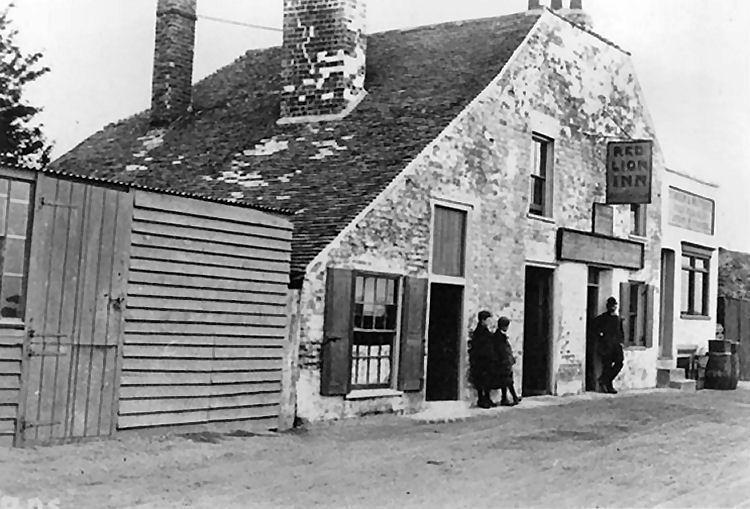 Above photo,
1900, kindly sent by Michael Mirams. |
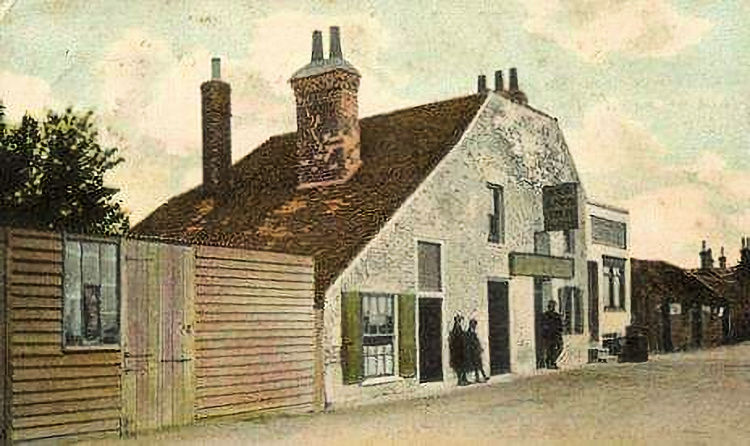
Above photo, 1900, coloured version of top photo. |

Above photo, date unknown. |
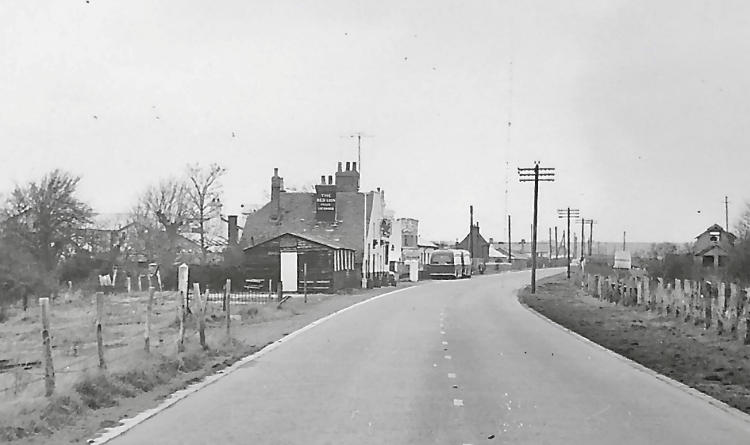
Above photo circa 1960s, kindly sent by Colin Varrall. |
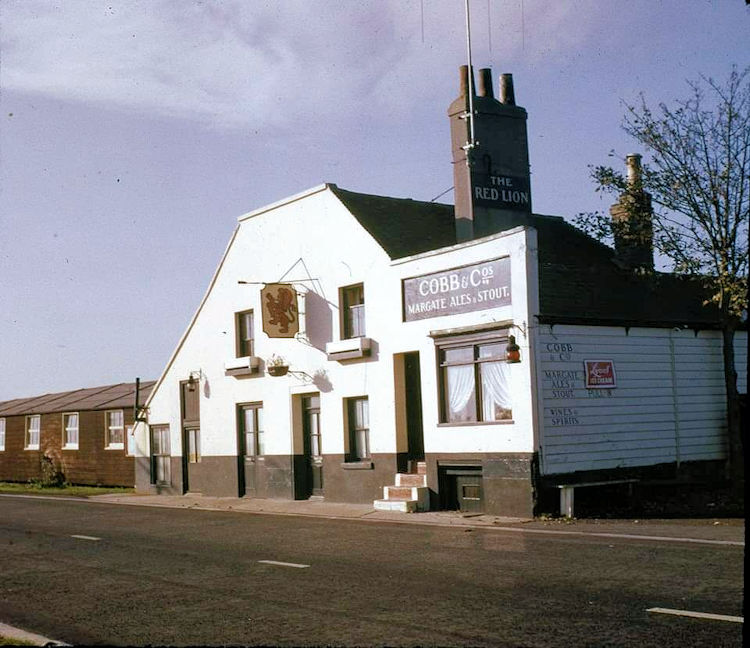
Above photo, date unknown. |
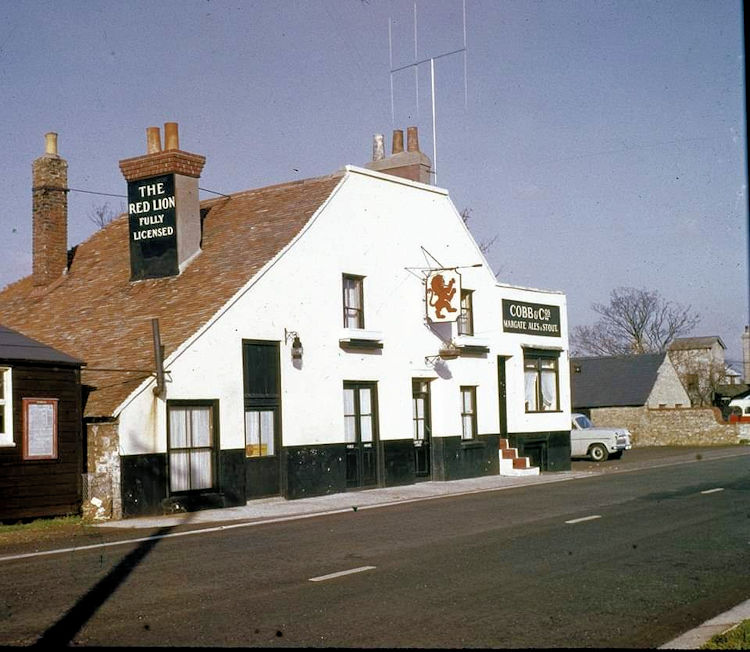
Above photo, date unknown. |
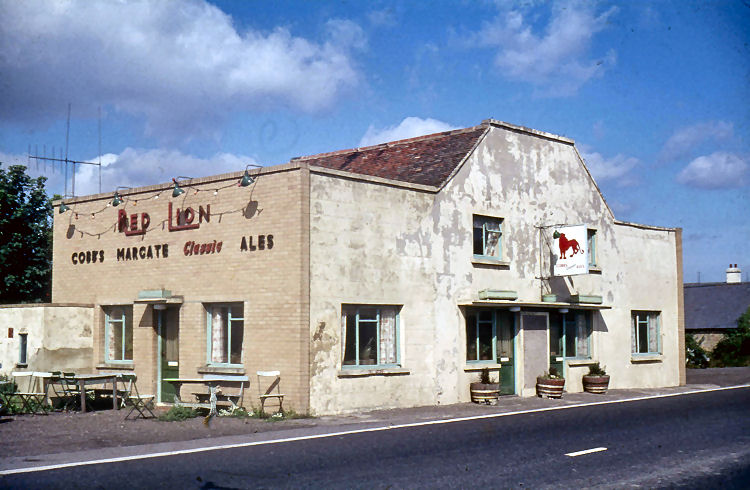
Above photo showing the pub in August, 1965. Kindly sent by Dieter Ott. |
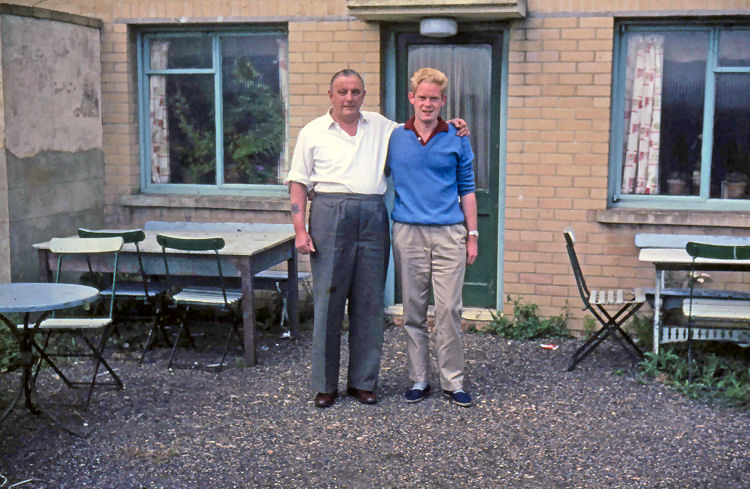
Above photo showing Mr. Doyle, left, the licensee in 1965 and Dieter Ott,
who was over from Baden Baden, Germany to learn English. Kindly supplied
by Dieter Ott. |
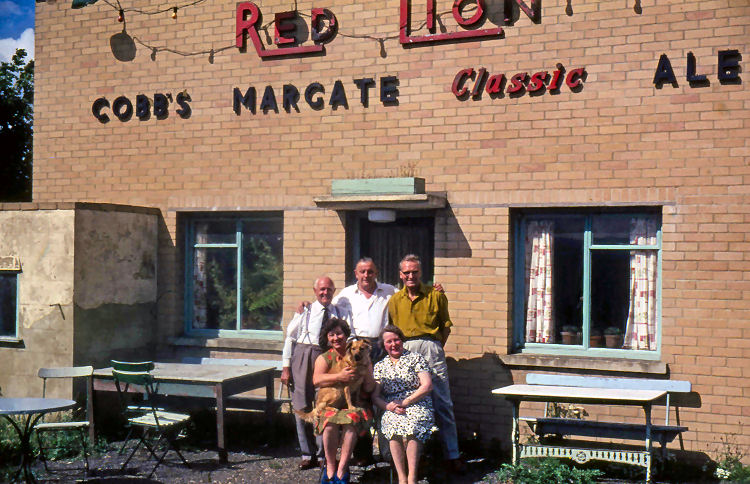
Above photo August 1965, showing Mr. Doyle and his sister's husband,
left, and sister, front right. Kindly supplied by Dieter Ott. |
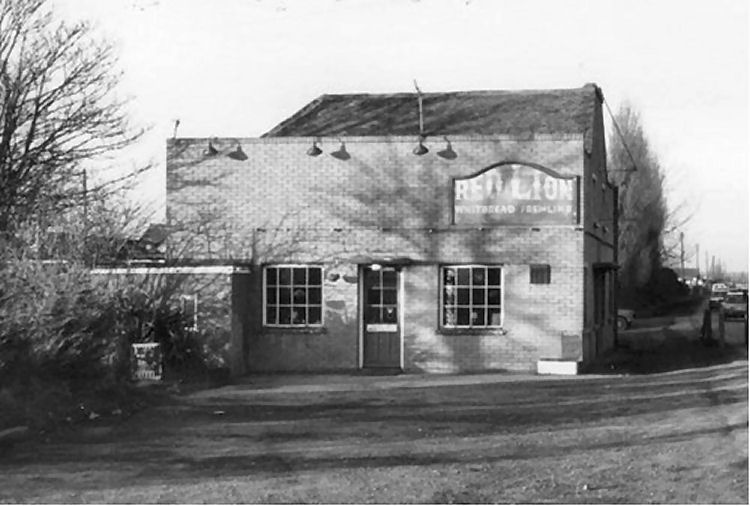
Above photo, 1989, kindly sent by Michael Mirams. |
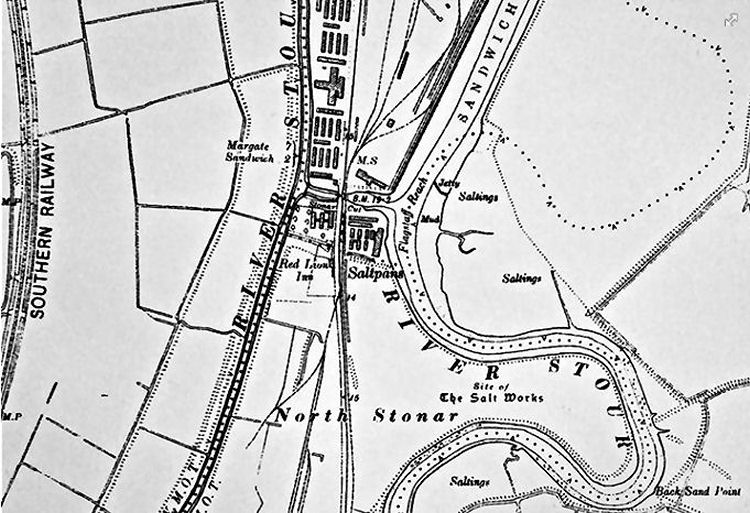
Above image showing a map of the area, date unknown. The "Red Lion" is
in the centre/left. |
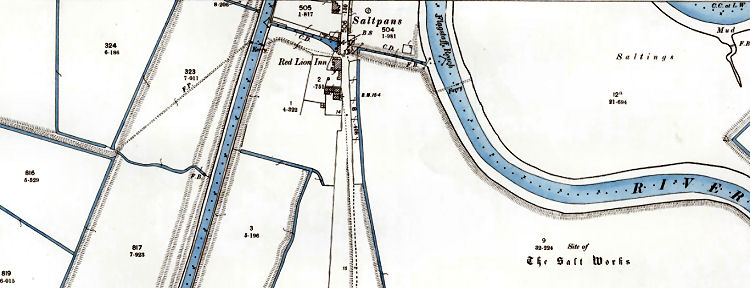
Above map 1896. |
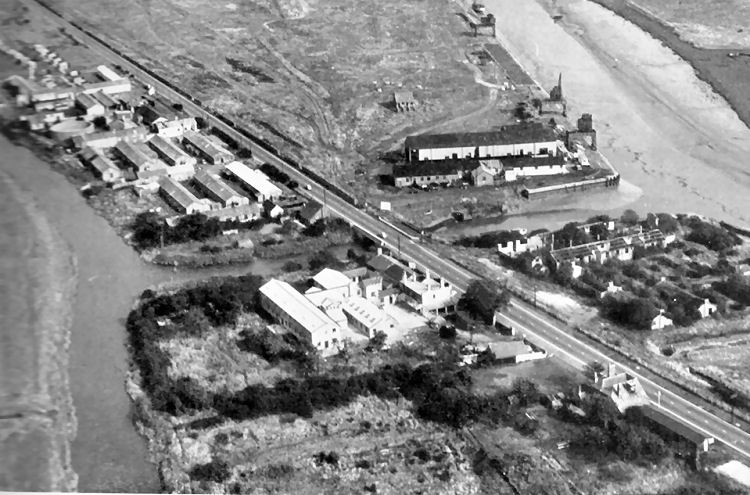
Above aerial view 1957 showing the "Red Lion" bottom right. |
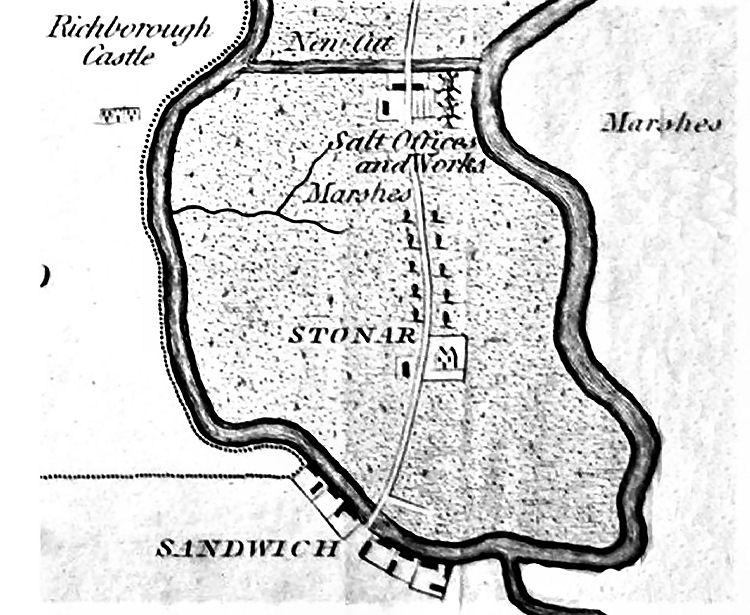
Above map, date unknown. |
The industrial site of Stonar is situated along the Ramsgate to Sandwich
Road, and there are few private dwellings near the "Red Lion" pub. But in
the 1700s, a Salt Pan Works was begun here. The idea was to extract salt by
evaporating the sea water left by beach receding tide, which passed from the
River Stour through the man-made Stonar Cut, and thence to the sea. The "Red
Lion" was open before 1829, and served the labourers who worked on the salt
pans and had their humble cottages near the inn. The house was also a useful
stopover for travellers between Sandwich and Ramsgate.
|
Kentish Gazette, 30 November, 1821.
Coroner’s Inquest.
On Tuesday and Wednesday an Inquest was held at St. Lawrence, in the Isle
of Thanet, by Mr. T. T. Delasaux, one of the Coroners for this
county, on the body of Eleanor Tritton, a young woman servant to Mr.
Curling, of Ozengall, who was found dead on Monday morning, on the
Turnpike road, near St. Lawrence.
The first witness called was Thomas Wood, of St. Stephen's, near
Canterbury, who stated that he found
the body about six o'clock on Monday morning, as he was on his
journey to Ramsgate, with a load of wood.
Mr. Curling was examined and deposed to the absence of the deceased,
the search made after her, the subsequent finding of the body, and
removing it to the Workhouse, at St. Lawrence, and the circumstances
which led them to suspect a person named John Paine.
Some circumstances leading to the suspicion of Paine's having taken
up the deceased into a single horse chaise, which he was driving
from Sandwich, on Sunday evening, were stated by John Tipper, who
keeps the "Red Lion" public house, on the road from Sandwich into
the Isle of Thanet, and by William Gibbons, the keeper of Ebb's
Fleet Turnpike Gate, on the same road.
The next witness examined was John Castle, a servant to Mr. Curling,
who deposed that on Sunday afternoon, Eleanor Tritton, the deceased,
who was cook in the family of his master, left Ozengall, and not
returning at her usual hour (nine o’clock) he went out to meet her,
and to accompany her home; that he had proceeded about three
quarters of a mile, when he met a chaise, and the person who
accompanied him (John Mummery) called out "Ozengall," the name of
the farm where the deceased lived servant; that thereupon the said
Eleanor Tritton, whom he knew by her voice, replied, "Castle, for
Heaven's sake take me out," moaning out of the chaise in which she
was riding; that then, the person who was driving, whipped the
horse, which immediately sprung forward at an increased rate; that
he then turned round and followed the chaise as fust as he could;
that on turning the corner from the Sandwich, into the Canterbury
road, the deceased said "for Gods sake take me out," and she
appeared attempting to throw herself into his arms, but she was
prevented from doing so, by the man who was in the chaise pulling
her back. She then said "Lord have mercy upon us; come on Castle."
Witness continued following the chaise on the road leading towards
Ramsgate, but could not overtake it; and on its turning out of the
present turnpike into the old Sandwich road, and from thence towards
Chilton, he quite lost sight of it — Witness then proceeded towards
Ramsgate, and having arrived there, he perceived the chaise coming
from the Barracks, and followed it into the town; the nearer the
witness got to it the more the driver whipped. The chaise then
turned up Broad street and came down by the new chapel, then turned
up the High-street, through Chatham-street, into the Margate road,
where witness lost sight of it. Witness then went home to Ozengall
and told his fellow servant what had passed; and witness and the
said John Mummery took a lantern and searched in the fields for the
deceased, but could not find her; they then went home to bed, at
about two o'clock in the morning; and got up again about five, and
then his master was called by the said J. Mummery, who, in his
presence, informed him that the cook was missing. That thereupon his
master took his horse and proceeded towards Margate, having directed
Mummery and himself to take the Ramsgate road, which they did,
having previously appointed to meet at the "Spread Eagle," Ramsgate
after they had made the necessary search. That they met there, and
witness communicated to his master, as did also Mummery, that the
took was dead, and stated where she was. Witness had examined the
body of the deceased, and found it was the said Eleanor Tritton.
That when he saw the chaise in Ramsgate; there was only one person
in it, the deceased was not in it.
John Mummery confirmed the testimony given by, the last witness.
Mr. Peake, surgeon examined the body, and deposed that there were no
marks of external violence, sufficient to have caused the death of
the deceased; and that he verily believed that she came by her death
through rupturing a blood vessel in the head; as the month was
filled with blood.
The Coroner summed up the evidence in a most able manner, and the
Jury, after a careful consideration, brought in a verdict of
Manslaughter against Pain, who was accordingly committed for trial
to the County Gaol, at Maidstone, under the Coroner’s warrant, and
immediately conveyed there.
A purse, containing a Sovereign and some silver, was found in the
pocket of the deceased, so that it does not appear she had been
robbed — nor from the testimony of the surgeon who examined the
body, does it appear that her person had been violated; the
probability therefore is, that in jumping out of the chaise the
deceased fell with such violence as to rupture a vessel in the head,
which caused strangulation. The prisoner Pain, had been employed on
Sunday, to drive a gentleman in the gig from Ramsgate, to St.
Alban’s Court, near Wingham, and was upon his return home to
Ramsgate, when he overtook the deceased.
|
|
Evening Mail, Friday 30 November 1821.
Mysterious death.
On Saturday last (25th inst.), a female servant, named Eleanor Tritton,
who lived as cook with Mr. J. Curling, at Oxengell, near St.
Lawrence, in the Isle of Thanet, left her masters house, on a visit to
her sister, at Sandwich, and was expected to return in the
evening of that day; but the hour of nine having arrived, and not making
her appearance, two of the men servants of the house
went out to meet her, and in a quarter of an hour afterwards, when near
the direction post, where the road from Sandwich diverges
in different directions, they observed a gig or one horse chaise
approaching, in which were a man and a female, and having made
themselves known, the woman called to one by name, earnestly entreating
they would stop the horse, and adding, "For God's sake
take me out;" but the man who drove instantly whipped the horse, which
set off at full speed, so as to prevent any attempt to stop
it. One of the person's, however, pursued the chaise on foot into the
direction leading to Ramsgate, and followed her it in that
direction till he perceived that the driver, having passed Nether-court,
had turned out of the turnpike road into a lane on the right,
leading to Pegwell, and accordingly cross the fields, the more readily
to intercept it; but being unsuccessful, he still continued the
pursuit into Ramsgate, where, by the light of the lamps, he first
observed that the female was missing, and the man who drove
directing his course through Ramsgate into the road leading to Margate,
all further trace of the chaise was lost; and it now being
ten o'clock, he gave up the pursuit, and returned to his master's house.
An immediate search was in consequence made in every
direction, during the night, for the female who was missing, but without
success, till about five yesterday morning (Monday last),
as a man, named Wood, was proceeding from the vicinity of this city,
with a car load of bavins, to Ramsgate, he discovered a
female lying lifeless in the road, within a few rods of the grounds of
Nether-court, which upon further examination was found to
be the body of the unfortunate woman, with several bruises in her face,
as if from the effects of blows. Assistance being procured,
the body was carried to the workhouse at St. Lawrence, where it now
awaits the coroner's inquest, which will be held on it this
day.
It did not appear - from a purse, containing a sovereign and some
silver, which was found in her pockets - that she had been
robbed; and it is to be lamented that the person who pursued the chaise
should, in crossing the fields with the good intention
above described; having left the main road before he reached the spot
where the body was found. The deceased was about 30 years
of age, and had lived with Mr. Curling, at Oxengell upwards of five
years, by whom, as well as by his family, she was much
respected for her good conduct. Since writing the above, we learn, that
the man who drove the chaise has been discovered, and
committed to St. Augustines gaol, till the results of the inquest shall
be known.
Kentish Gazette.
|
|
Public Ledger and Daily Advertiser, Saturday 1 December 1821.
We yesterday mentioned the mysterious and melancholy death of Eleanor
Tritton, cook to Mr. J. Curling, at Oxengell, in the Isle
of Thanet, after being carried off by a man in a chaise. The man who
drove the chaise has been discovered; his name is ____
Paine. An inquest has been held on the body, when a surgeon deposed,
that there were no marks of external violence, sufficient to
have caused the death of the deceased; but that he verily believes that
she came by her death through rupturing a blood vessel in
the head. The jury, after a careful consideration, brought in a verdict
of manslaughter against _____ Paine, who was immediately
committed for trial to Maidstone gaol.
|
|
Evening Mail, Monday 3 December 1821.
Mysterious death. Coroner's inquest.
An inquest was taken on Tuesday last, 27th ult., and continued till the
following day, before Thomas Delasaux, Esq., one of the
Coroner's for Kent, at St. Lawrence, in the Isle of Thanet, on the body
of Eleanor Tritton, the unfortunate woman found dead
under some mysterious circumstances, as stated in our last.
[See the Evening Mail on Friday last.]
The first witness called was Thomas Wood, who deposed that he lived at
St. Stephen's, near Canterbury, and that on Monday
morning last, about 6, he found the body of the deceased in the highway
leading from Canterbury to Ramsgate.
Mr. John Curling, of Oxengell, was next examined, and deposed to the
permission given to the deceased, who had lived with him
for upwards of five years as cook, to go out for a holiday on the
Saturday; and that on being informed on the following morning
that she was lying dead in the road near the turnip field of Mr.
Garrett, he went there and saw the body, and directed it to be
removed to St. Lawrence workhouse; that he then proceeded towards
Sandwich, where, on the road at Ebb's Fleet-gate, he learnt
that a gig had passed through there about nine on the preceding evening
from Sandwich, and that a person of the name of Pain was
in it; and on further inquiry, that Eleanor Tritton, the deceased, and
the said gig with Pain in it, had also passed the "Red Lion"
public house at Stonar, on the same evening.
John Tipper, the landlord of the "Red Lion" public house
above-mentioned, deposed that the prisoner Pain stopped at his house on
Sunday evening, about nine o'clock, in a single horse chaise, and had a
glass of English gin, observing that he had overtaken a
young woman and requested her to ride, which he refused; and he (Tipper)
thinking it late for a young woman to be walking alone,
went out and heard some person approaching, who, having nearly reached
his house, a woman dressed in black, and in every
respect resembling the deceased, said, "Is there any reason here waiting
for me from Oxengell?" to which he replied "No." She
then said she should walk on, and proceeded accordingly; soon after
which the said John Pain left his house in the chaise, and was
apparently very sober.
William Gibbons, the innkeeper of Ebb's Fleet-gate, deposed that the
prisoner passed through the gate on Sunday afternoon, in a
single horse chaise, in which, besides himself, who was driving it,
there was a gentleman; and that about nine in the evening of the
same day the said chaise, also driven by Pain, returned through the
gate, the only being in it; at the same time a young woman
dressed in dark clothes was walking by the side of the chaise, and
appeared to be in conversation with the person who drove it.
John Castle, of the parish of St. Lawrence, servants in husbandry,
deposed, that on Sunday afternoon, November 23rd, the
deceased left the house of Mr. John curling, of Ozengell; that the said
Elena Tritton not returning at her usual hour (nine o'clock),
he went out to meet her to accompany her home; that he had preceded
about three quarters of a mile, when he met a chaise, and
the person who accompanied him (John Mummery) called out "Ozengell," the
name of the farm where the deceased servant lived;
that thereupon the said Eleanor Tritton, whom he knew by her voice,
replied, "Castle, for heaven's sake take me out," meaning out
of the chaise in which she was riding; that then the person who was
driving whipped the horse, which immediately sprang forward
at an increased rate; that he then turned round, and followed the chaise
as fast as he could; that on turning the corner from the
Sandwich into the Canterbury Road, the deceased said, "For God's sake
take me out," and she appeared attempting to throw
herself into his arms, but she was prevented from doing so by the man
who was in the chaise pulling her back. She then said,
"Lord have mercy upon us; come on, Castle." Witness continued following
the chaise on the road leading towards Ramsgate, but
was not able to overtake it; and on it's turning out of the present
turnpike-road into the old Sandwich road, and from thence
toward Chilton, he lost sight of it. Witness then proceeded towards
Ramsgate, and having arrived there, he perceived the chaise
coming from the barracks, and followed it into the town; the nearer
witness got to it the more the driver whipped. The chaise then
turned up Broad Street, and came down by the new chapel, and turned up
the High Street, through Chatham Street into the
Margate Road, where witness lost sight of it. Witness then went home to
Ozengell, and told his fellow-servant what had passed;
and witness said that John Mummery took a lantern and searched in the
field for the deceased, but could not find her; they then
went home to bed, at about two o'clock in the morning; he got up again
about five, and then his master was called by the said J.
Mummery who, in his presence, informed him that the cook was missing.
That's thereupon his master took him home, and
proceeded towards Margate, having directed Mummery and himself to take
the Ramsgate Road, which they did, having previously
appointed to meet at the "Spread Eagle," Ramsgate, after they have made
the necessary search. That they met there, and witness
communicated to his master, as did also Mummery, that the cook was dead,
and stated where she was. Witness had examined the
body of the deceased, and found it was the said Eleanor Tritton. That
when he saw the chaise in Ramsgate, there was only one
person in it; the deceased was not in it.
John Mummery disposed, that in company with Castle he followed the
chaise till he lost sight of it on the turnpike-road leading
from Canterbury to Ramsgate, near Mr. Garratt's fir-trees; Castle be in
about four rode before him. In other particulars his
evidence was corroborated by that of Castle.
Mr. Algernon Sidney Peake, surgeon, of Ramsgate, deposed, that he had
every reason to believe that the deceased came to her
death by the rupture of a blood vessel in head; and he was led to that
conclusion by the swollen appearance of her features, and her
mouth being full of blood.
The coroner summed up the evidence in a most able manner, and the Jury,
after a careful consideration, brought in a verdict of
manslaughter against John Pain, who was immediately committed, under the
Coroner's warrant, for trial to Maidstone Gaol;
whither he was escorted by two peace officers, and passed through this
city on Wednesday in one of the night coaches.
Kentish Gazette.
|
|
Kentish Gazette, 28 December, 1821.
DEATH.
Dec. 22, Mrs. Tipper, wife of Mr. John Tipper, landlord of the "Red
Lion," public house, Stonar, near Sandwich.
|
|
Yorkshire Gazette, Saturday 19 January 1822.
Mysterious death.
Under this head, in a paper of the 1st ult., we gave the proceedings of
an inquest held at St. Lawrence, in the Isle of Thanet on the
body of Eleanor Tritton, in relation whose death some very extraordinary
and suspicious circumstances were disposed to. The
deceased will be recollected, lived servants with Mr. J. Curling, of
Ozengell, who, on Sunday, November 25th, gave her
permission to go and see her sister at Sandwich. A servitude of upwards
of five years had established her character for propriety
and punctuality, and very much alarm was felt by the family when the
hour of nine arrived, and she had not returned. Two of the
male domestics were sent in quest of her. Before the inquest, these men
deposed that, about half a mile from the house they met a
chaise which they hailed; a voice, which lane you to be that of Eleanor
Tritton, exclaimed "for God's sake take me out;" the driver
(John Paine) whipped the horse and proceeded onwards. Next morning the
corpse of the young woman was found in a field by the
roadside. A Surgeon of Ramsgate gave in his opinion, that she came to a
death by the rupture of a blood-vessel. The jury returned
a verdict of Manslaughter against Paine, the driver, who was
apprehended, and now lies for trial in Maidstone Gaol. The Kentish
Gazette of yesterday says. The body of Eleanor Tritton, the poor girl
who was found dead near Ramsgate, has lately been, by the
desire of her father, taken up, opened, and carefully examined by
Messrs. Girard and Chambers, Surgeons, in the presence of the
distress father, and her master; the result is, of course, kept private.
|
|
Belfast Commercial Chronicle, Saturday 30 March 1822.
John Paine, was indicted for the murder of Eleanor Tritton, at Ramsgate,
on the 25th of November last, I throwing her out of a
gig, whereby she was suffocated.
The Prisoner was a post-chaise boy of the "Bull and George Inn," at
Ramsgate; the deceased, a young female servants, in the
employment of a farmer, named Carling, residing at Oxengell, in the Isle
of Thanet. Mr. Carling gave her leave to go and see her
friends at Sandwich. It was agreed that two of her fellow servants
should meet her on the road in the evening. The prisoner have
been sent in a one-horse chaise to drive a Gentleman from Ramsgate to
Sandwich. In the evening, when driving home, he
overtook the deceased, and took her up. About nine o'clock her fellow
servants, named Castle and Mummery, met the gig on the
road. It was very dark. The latter called out the name of their master's
farm, and the deceased, recognising the voice, said, "For
heaven's sake, Castle, take me out!" The prisoner, upon this, whipped
his horse and drove on faster. The deceased stood up in the
gig, as if the jump out; when prisoner pulled her down again. She said,
"Lord have mercy upon us come on Castle." Castle and his
companion ran after the chaise as fast as they could, but could not
overtake it. The prisoner drove on as fast as he could. The gig
was pursued to Ramsgate, and there lost sight of. Next morning the
deceased was found dead by the roadside, within six rods of
the spot where are the witnesses met with the gig. The prisoner had made
a circuitous road home. Distinct evidence was given to
connect the prisoner with the transaction, but as to the precise manner
in which the deceased came by her death, the evidence was
a blank. Three medical men gave it as their opinion that the deceased
died from suffocation, by falling on her face on the
greenswood by the roadside, and remaining there without respiration.
There was a slight bruise on her nose, and her mouth was
full of coagulated blood. After she had been buried three weeks, she was
taken up, and two surgeons opened the body. The lungs
were found to exhibit decided appearance of suffocation. The first
surgeons who had seen the body gave it as his opinion that she
died of apoplexy, from the concussions she received in the full
producing the sudden stoppage of respiration.
The case went to the Jury, and they found the prisoner Guilty of
Manslaughter, and he was sentenced to pay a fine of 21s. and to
be imprisoned for 12 months in the County Gaol.
|
|
From the Kentish Gazette, 17 October 1837.
DEATHS.
Oct 5, at Sandwich, Mr. John Tipper, many years landlord of the "Red
Lion," Stonar, aged 77.
|
|
Canterbury Weekly, 21 October, 1837.
Death.
Oct 5, at Sandwich, Mr. J. Tipper, many years landlord of the "Red
Lion," Stonar, aged 77.
|
|
South Eastern Gazette, 30 October, 1860.
STONAR. A Man Found Drowned in the Sandwich Haven.
On Friday last, C. J. Fox, Esq., deputy coroner, held an inquest at
the "Red Lion Inn," in this parish, on the body of Thos. Kingsland,
a farm servant, in the employ of Mr. Sladden, who was found drowned
in the Sandwich haven the previous day.
It appeared from the evidence adduced that the deceased was seen by
a fisherman named Charles Rogers, while out in the haven, in the
water, in the afternoon. He made the body fast to the boat and
afterwards removed it to a lodge, when it was searched, and £6 17s.
l 1/2d., and two bills receipted for £1 11s. 4d., were in his
pockets. The deceased was seen at the corner of the Cattle market,
in Sandwich, on the night of the 11th inst., going in the direction
of his father’s house. A letter was produced from Mr. Sladden, to
the effect that the deceased took his wages on the 11th October,
amounting to £9, and left with the intention of going to his home
for a holiday.
The jury returned a verdict of "Found drowned in the Sandwich haven,
but from what cause there is not sufficient evidence to show."
|
|
From the Kentish Chronicle, 3 November, 1860.
STONAR.
An inquest was held by C. J. Fox, Esq., deputy-coroner, at the "Red Lion
Inn," Stonar, on Friday, on the body of Thomas Kingsland, a farm
servant, found dead in the adjoining parish of Minster. The following
evidence was taken:—
Charles Rogers, of Stonar, fisherman, said:— Yesterday afternoon, the
25th October, I was out in the Sandwich Haven, near Stonar, fishing. I
saw something floating on the water. It was about twelve or fourteen
feet from me. After it had passed the boat, my little boy, who was with
me, said, "Oh! father, it's a man." I sculled up to it, and picked it
up, and found it was the body of a man. I made it fast to the boat, and
went and told Mr. Cook, who lives at the "Red Lion," close by. We
afterwards returned to the boat, and I assisted in removing the body
from the water to the lodge, where it is now lying, I identify the body
as that of the deceased. I was present when the body was searched. There
was found in money £6 17s. 11 1/2d., and two bills receipted, for £1
11s. 4d., which appeared to have been paid on the 11th Oct. These, with
other articles found in deceased's pockets, were taken possession of by
Superintendent Stokes.
By the Foreman:—I never observed any marks of violence on the body of
the deceased. It was very much decomposed when I found it.
Eliza Pilcher, wife of Thomas Pilcher, of St. Peter's-street, Sandwich,
carpenter, said:— The deceased was my cousin. On the evening of the 11th
Oct., about twenty minutes past eight, I saw him at the corner of the
Cattle Market, in Sandwich. I wished him "Good night" as he passed. I
noticed that he had a bundle under his arm, containing us I believe,
some of his clothes. The direction he was going led to his father’s
house, who lived on the Deal road, near Sandwich, close to the Haven.
The deceased, on the 11th of Oct. had a brother, who was a cabin-boy on
board a schooner lying in the Haven, close to his father's house; and I
believe that he was going to the vessel, to see his brother, and not
knowing the way accidentally fell into the water, and was drowned. When
I saw the deceased at the Cattle Market, he did not appear to be under
the influence of liquor. He was a very steady young man. He was 26 years
of age, and lived as farm servant at Mr. Sladden's, at Adisham Court.
When I saw him in the evening of the 11th of Oct., he was, I believe, on
his way home to his father's to spend his Michaelmas holidays.
A letter from the deceased's master (Mr. Sladden) was produced, wherein
he stated that on the 11th Oct. the deceased took his year’s wages,
amounting to £9, and left with the intention of going home for a few
days' holiday.
The jury returned a verdict of "Found drowned in the Sandwich Haven, but
from what cause there is not sufficient evidence to show."
|
|
From the Kentish Chronicle and General Advertiser, 5
October, 1861. Price 1 1/2d.
DEATH OF CAPTAIN DURANT AT RAMSGATE.
On Sunday afternoon Captain Durant was suffocated in a dike, in the
marshes adjoining the Sandwich road. It appears that he arrived at
Ramsgate from Herne Bay on Saturday, and put up at the “Royal
Hotel.” On Sunday morning he was seen on the Ramsgate sands,
apparently very much the worse for liquor. He was walking up to his
knees in the water with his boots on. He then returned to the hotel,
changed his boots, and proceeded to the Roman Catholic chapel, where his
conduct was such as to cause great annoyance to the congregation, and he
was forcibly ejected. Subsequently he hired a boy and pony chaise to
take him for a drive. After proceeding to the Salt Pond on the Sandwich
road, he left the chaise in the care of the boy and set off on a ramble
among the dikes. Nothing appears to be known of his subsequent
movements, except that some time afterwards he was found dead in a dike.
An inquest was held on the body on Tuesday last at the “Red Lion,”
Minster, before T. T. Delasaux, Esq., the coroner, when the following
witnesses were examined:—
Stephen West, labourer, living in the parish of Stonar, said:— On
Sunday last, at about four o'clock in the afternoon, I was on the sea
wall, and saw the deceased come over the sea wall and go towards the
river Stour; and he shortly afterwards came back and fetched a white dog
(which I have this day seen), and which he took in his arms, and went
again towards the river. As I saw nothing again of the deceased, I went
in search of him, and having procured some drags, I found the body of
the deceased in the water. He was then quite dead. It did not appear to
me that he had accidentally fallen into the water, but I believe he
threw himself in. The shoes of the deceased were found on the shore
about six yards from the spot when his body was found.
Charles Rogers, fisherman in the parish of Stonar, confirmed the
evidence of the last witness.
George Watts, a labourer, living in Ramsgate, said that on Sunday
last he drove the deceased to Margate in a pony chaise, he returned and
took him to the Sands, where he bathed. Shortly after he drove him to
the Catholic Chapel, and left him there, calling for him, by his orders,
when the services was over. Subsequently he took him to the “Royal
Hotel,” Ramsgate, where witness believed he was staying. He
afterwards drove the deceased to Pegwell Bay, and then to the Bridge, in
the parish of Minster, where he set him down. He remained there half an
hour, and saw the deceased jump over a ditch after some bullocks, he
told witness several times to return home, and he did so. Deceased was
not sober when he left him, and on the road he had drunk gin and ale at
two houses.
Thomas Noakes, Sergeant K.C.C., stationed at Minster, said that he
searched the body of the deceased when it was taken out of the water,
and he found a gold watch, chain, and seal, two gold rings, and 1s. 6d.
in silver and copper.
Mr. R. T. Hiscock said that he kept the “Royal
Hotel,” Ramsgate. The deceased was an inmate of his house. He came
there on Saturday, with his wife. Witness had known him for the last two
years. He appeared to be in an excited state when he saw him on
Saturday. He believed that he had been confined in a Lunatic Asylum in
France.
The Coroner briefly addressed the Jury, who returned a verdict of
“Accidentally Drowned.”
|
|
From the Maidstone Telegraph, Rochester and Chatham Gazette, 12 October 1861.
Ramsgate. The Shocking Death of Captain Durant.
An inquest on the body of this unfortunate gentleman was held on Tuesday
last, at the "Red Lion Inn," Minster, before T. T. Delasaux Esq., the
coroner, when the following witnesses were examined.
Stephen West, a labourer, living in the parish of Stonor, said:- On
Sunday last, at about four o'clock, I was on the cut wall, and saw the
deceased come over the sea wall and go towards the River Stour; and he
shortly afterwards came back and fetched a white dog (which I have this
day scene,) which he took in his arms and went again towards the river.
As I saw nothing again of the deceased, I went in search of him, and
having procured some drags, I found the body of the deceased in the
water. He was then quite dead. It did not appear to me that he had
accidentally fallen into the water, but I believe he threw himself in.
The shoes of the deceased were found on the shore about 6 yards from the
spot where the body was found.
Charles Rogers, fisherman in the parish of Stoner, confirmed the
evidence of the first witness.
George Watt, labourer, living in Ramsgate, said that at 4 o'clock on
Sunday last he drove the deceased Margate in a pony chaise. He returned,
and took him to the sands, where he bathed. Shortly after he drove him
to the Catholic chapel and left in there, calling for him by his orders,
when the service was over. Subsequently he took him to the "Royal
Hotel," Ramsgate, where witness believed that he was staying. At about
10 o'clock he drove the deceased and Pegwell Bay, and then to the
bridge, in the parish of Minster, where he set him down. He remained
there half an hour, and saw the deceased jump over a ditch after some
bullocks. He told witnessed several times to return home, and he did so.
Deceased was not sober when he left him, and on the road he drank gin
and ale at two houses.
Thomas Noakes, Sergeant K.C.C. stationed at Minster, said he searched
the body of the deceased when it was taken out of the water, and found a
gold watch, chain, and seal, 2 gold rings, and 1s. 6d. in silver and
copper.
Mr. R. T. Hiscock said he kept the "Royal Hotel," Ramsgate. The deceased
was an inmate of his house. He came there on Saturday with his wife.
Witness had known him for the last 2 years. He appeared to be in an
excited state when he saw him on Saturday. He believe that he had been
confined to a lunatic asylum in France.
The coroner briefly addressed the jury, who returned a verdict of
Accidentally Drowned.
|
|
From the Kentish Chronicle, 23 July, 1864.
SUICIDE.
On Monday Mr. W. P. Callaway, and a respectable jury, held an inquest at
the “Red Lion” public house, Stonar, near Sandwich, on the body of
Charlotte Rolfe, aged 25, who had committed suicide by drowning herself.
Several witnesses were examined, but the facts may be briefly stated.
Last year the deceased, who is the mother of three illegitimate
children, was living in service at Ramsgate, but since September she had
resided with her mother at Sandwich. For some time past she has
regularly received £1 from William Walker, a seaman on board a ship of
war, and there was an agreement between her and Walker that she was to
place the monies in the Savings’ Bank in order that they might be
married on Walker's return home. Instead, however of putting the money
in the Savings’ Bank she spent it. About two mouths ago Walker wrote for
the money, stating that he wanted to buy his discharge to return home.
On the receipt of the letter the girl's manner became changed.
After leaving her mother’s on Monday she went to the house of a
neighbour. She was then crying, and said she had more on her mind than
anyone was aware of, and that her mother’s husband had threatened to cut
her throat, and wring the necks of her children. After staying in the
neighbour's house till evening she went away and was not afterwards seen
alive. Her body was found floating in the river Stour, at Stonar, about
five o'clock on Saturday afternoon, in her pocket was found a letter
from Walker. The letter stated that the writer was tired of the sea and
wished to return home. He enclosed a half-sovereign and expressed a hope
to marry the person written to on his return. The jury returned a
verdict that the deceased had committed suicide while in an unsound
state of mind.
|
|
From an email received 9 August 1881.
William Edward Fuller.
Personal Estate under £200.
The will of William Edward Fuller, late of "The Red Lion" Inn
Saltpans in the parish of Stonar in the County of Kent, Licensed
Victualler who died 12th February 1881 at the said inn was proved at
Canterbury by Emma Fuller of Inn Widow the Relict the sole Executrix.
The above is only an index to his full will but does at least provide
a precise location and date of death. It is interesting to note that he
was only 35 when he died begging the question "what did he die of I
wonder? Emma outlived him remarried and died in 1903.
In the 1871 census return William was listed as a domestic gardener.
|
|
Whitstable Times and Herne Bay Herald, Saturday 31 March 1883.
One of the enquiries he held lead to an important change in the law. A
young woman named Eleanor Tritton was riding in a post
chaise, and on the post boy attempting to take a liberty with her, she
jumped out, and was killed. By direction of the coroner the
jury returned a verdict of manslaughter, and offence at that time only
punishable by a year's imprisonment and a fine of one
guinea. The law was subsequently ordered, and now sentences for the
crime of manslaughter vary from a short term of
imprisonment to penal servitude for life.
|
|
From the Dover Express and East Kent News, 7 May, 1909.
WINGHAM PETTY SESSIONS
FOOLISH THEFT
The Wingham Petty Sessions were held at Wingham yesterday morning,
before H. F. Plumtre Esq. (in the chair), Sir A. N. Wollaston, Sir James
Lyall, the Rev. S. G. H. Sargent, Maj. General Lloyd, and H. W.
Plumptree, and A. W. Fleebrace, Esq.
Harry Andrews, crter, was charged with stealing from Solson Farm,
Eastry, on 10th April, one coupling bat, value 2/6, the property of
Lewis Petman.
Lewis Petman, farmer, of Eastry, stated that on the 10th April his
man reported to him that a coupling bat was missing from the field where
he had been working that morning. Witness informed the police, and
subsequently the bat was found in the possession of the defendant
Andrews. Its value was 2/6.
Arthur Howard, labourer, in the employ of Mr. Petman, corroborated.
P.C. Butler, stationed at Eastry, deposed that from information
received about 2.15 p.m. on April 10th, he cycled to the "Red Lion,"
Stonar. Outside he saw a horse and waggon, and looked into it he saw the
coupling bat, now produced. The defendant came out of the "Red Lion,"
and in reply to witness, said he was in charge of the waggon. Witness
then informed him that he was making enquiries about a coupling bat that
had been stolen from Solson Farm, Eastry. The defendant said he knew
nothing about it, but afterwards turned to his waggon and taking out a
coupling bat, said, "Is that it?" Witness replied that it was similar to
the one stolen, and the defendant then said, "I saw it lying on the
roadside and picked it up and threw it in my waggon as I thought it
would come in useful." He charged him and brought him to Sandwich Police
Station.
The defendant said he had a sudden temptation, and he was very sorry
for what he had done.
A fine of 10s., or in default 7 days, was inflicted.
|
|
From an email received, 10 February 2023.
I have been
doing some research into the history and development of Richborough Port by the Royal Engineesr during the First Wold War.
It would appear that a letter was sent to the owners of the Red Lion
pub, the Cobb & Co. Margate Brewery, on 2nd June 1916. The letter was
sent to a Major Collard, who was a Royal Engineers officer and was
responsible for all military activity at Richborough Port.
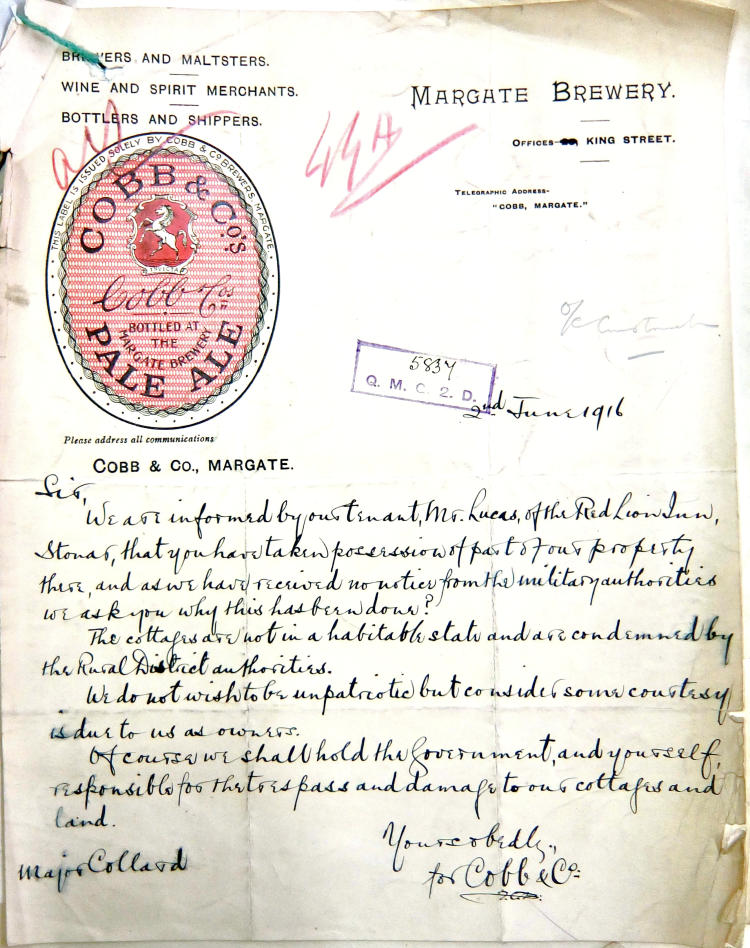
The letter reads:- "Sir, We are informed by our tenant, Mr. Lucas, of the
Red Lion Inn, Stonar, that you have taken possession of part of our
property there, and as we have received no notice from the military
authorities we ask you why this has been done? The cottages are not in a
habitable state and are condemned by the Rural District authorities. We
do not wish to be unpatriotic but consider some courtesy is due to us as
owners. Of course we shall hold the Government, and yourself,
responsible for the trespass and damage of our cottages and land."
At the moment, I don't know anything further about what took place from
this letter being written and sent to Major Collard, but I do understand
that the pub may have remained open and was quite often frequented by
many of the soldiers, who were billeted in the five military
accommodation camps at Richborough Port during the First World War. I
can imagine the pub was very popular, since it was located almost
central to the 2,200 acres site of Richborough Port, which had its five
camps accommodating at least 15,000 men and women by November 1917,
according to information given in the book "Richborough Port" written by
Major Halstead, who was the engineer responsible for the development of
the site.
Just to add, that the military possibly took over the Red Lion since
there are reports I have read also sent and signed by Major Collard,
during the early stages of the development of Richborough Port, which
gives orders for the possession of land and buildings around Stonar and
Richborough, as part of DORA (Defence of the Realm Act 1914), which was
passed by the Government on 8th August 1914, giving the Government a wide
range of powers, in order to requisition buildings, or land needed for
the war effort, and also to control communications, the nation's ports
and also to subject civilians to the rule of military courts.
Regards,
Colin Varrall.
|
|
From an email received 1 July 2016.
Hi,
I was in St. Martin's Churchyard yesterday and ticked a war grave for J H
Chapman died 2 November 1917. It caught my eye because he was in the buffs
like my great grandad, and because of his age, 61 when he died which seemed
old for a soldier.
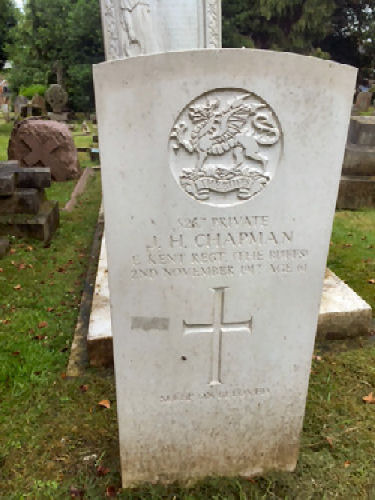
I came home and did a little research and turns out he was in the buffs
then transferred to the labour corps. He died in military hospital
Canterbury. Whether this was from wounds or illness overseas I don't know.
In any case he had already fought in the Zulu wars in the 1870's. Early in
his life he was a agricultural labourer but later, on the 1901 and 1911
census, he is shown as head of household and public inn at the "Red Lion"
pub Stonar which he ran with his wife Mary and one servant. I suspect he may
have remained the public and up to his death, or at least until he rejoined
the army. I note this seems to somewhat fill a gap on the known landlords on
the "Red Lion" page of your website.
I hope this is of some interest. Perhaps if you could add this info to
your website it would be a small but fitting tribute to this one man on this
100th anniversary of the beginning of the battle of the Somme.
Regards,
Richard Diedo. |
One time Cobbs tied house. Cobbs were founded in 1673, but Whitbread took
them over early 1968 and closed the brewery later that year. I believe the
pub was still serving the the late 1980s and possibly in the early 90s.
LICENSEE LIST
TIPPER John 1821-Oct/37 dec'd
LANGLEY Richard 1832+

BEERLING John 1841+
BURTON William 1847+
BURTON George 1851+
COOK James Gilbert 1871-74+ (age 57 in 1871 ) )

FULLER William Edward dec'd to Feb/1881
FULLER Emma Mrs Feb/1881-82+
(age 30 in 1881 ) )

RUBB Robert R 1890-91+ (also ferry keeper)
CHAPMAN John H 1901-11+ (age 55 in 1911 ) ) 
LUCUS A J 1913+

ROGERS Charles William 1921+
SWALLOW Tommy & Francis 1946

DOYLE D F Mr 1961-68+
BETTIS James C 1974+
 Cobb & Co
Cobb & Co
With so many "Red Lions" about, the above reference could well be for
another "Red Lion." But this was a Cobbs house
http://www.closedpubs.co.uk/redlion.html
 From the Pigot's Directory 1832-33-34 From the Pigot's Directory 1832-33-34
 From the Post Office Directory 1874 From the Post Office Directory 1874
 From the Post Office Directory 1882 From the Post Office Directory 1882
 From the Kelly's Directory 1903 From the Kelly's Directory 1903
 From the Post Office Directory 1913 From the Post Office Directory 1913
 Library
archives 1974 Library
archives 1974
 Census Census
|















